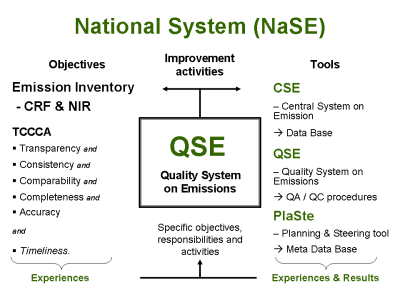meta data for this page
Chapter 1.2 - Institutional Arrangements
Inventory preparation and responsibilities
 Article 5.1 of the UNFCCC/Kyoto Protocol mandates the establishment of a National System for preparation of greenhouse-gas emissions inventories. The National System for Germany fulfils the requirements of the revised UNFCCC Reporting Guidelines on National Inventory Arrangements (UNFCCC Decision 24/CP.19), requirements which are binding under the Kyoto Protocol (according to UNFCCC Decision 19/CMP.1) and the European Greenhouse gas Monitoring Mechanism Regulation (525/2013). The German emission inventory as submitted to the Geneva LRTAP Convention is prepared in the very same institutional framework, by the same actors and processes.
Article 5.1 of the UNFCCC/Kyoto Protocol mandates the establishment of a National System for preparation of greenhouse-gas emissions inventories. The National System for Germany fulfils the requirements of the revised UNFCCC Reporting Guidelines on National Inventory Arrangements (UNFCCC Decision 24/CP.19), requirements which are binding under the Kyoto Protocol (according to UNFCCC Decision 19/CMP.1) and the European Greenhouse gas Monitoring Mechanism Regulation (525/2013). The German emission inventory as submitted to the Geneva LRTAP Convention is prepared in the very same institutional framework, by the same actors and processes.
The National System provides for the preparation of inventories conforming to the principles of transparency, consistency, comparability, completeness and accuracy. Such conformance is achieved through extensive use of the methodological regulations from the CLRTAP Guidelines and the EMEP/EEA air pollution guidebook, through ongoing quality management and through continuous inventory improvement.
The National System in Germany has been essentially institutionalized at three levels, at the ministerial level, at the level of the German Environmental Agency and the level outside the federal government. At the ministerial level, the system is leaded by the Federal Ministry for Environment, Nature Conservation and Nuclear Safety (BMU) through an agreement of the Secretaries of the ministries involved as policy paper “National System for Emissions Reporting” established from 05.06.2007, extended in December 2014. With the incorporation of the Federal Ministry of the Interior, Building and Community (BMI), the Federal Ministry of Defence (BMVg); the Federal Ministry of Finance (BMF), the Federal Ministry of Economic Affairs and Energy (BMWi), the Federal Ministry of Transport and Digital Infrastructure (BMVI) and the Federal Ministry for Food and Agriculture (BMEL) all the key institutions are included that are in a position to make high-quality specialised contributions to the preparation of the emission inventories.
The policy paper defines the relevant responsibilities of the various departments. In addition, it was resolved that the German Environment Agency (UBA) should serve as the Single National Entity (National Co-ordinating Agency) for Germany. The tasks of the Single National Entity include the planning, preparation, and storage of the inventories and the description of those in the inventory reports as well as the quality control and quality assurance in all relevant process steps. In addition, various other institutions and organizations outside the federal government are integrated into the National System via agreements with the Single National Entity.
Instruments of the Single National Entity
The German Environment Agency has developed a range of instruments for supporting the Single National Entity in carrying out its tasks.
The German Environment Agency's Central System on Emissions (CSE) database is the national, central database for emissions calculation and reporting. It is used for central storage of all information required for emissions calculation (methods, activity rates, emission factors). The CSE is the main instrument for documentation and quality assurance at the data level. It also tracks data provider responsibilities.
Within the German Environment Agency, the Quality System for Emissions Inventories (QSE) provides the necessary framework for good inventory practice and for routine quality assurance. Established in 2005 via in-house directive 11/2005, within the German Environment Agency it comprises the processes necessary for continually improving the quality of emissions inventories. The framework it provides includes defined responsibilities and quality objectives relative to methods selection, data collection, calculation of emissions and relevant uncertainties and recording of completed quality checks and their results (confirmation that objectives were reached, or, where objectives were not reached, listing of the measures planned for future improvement). The quality control procedures have been developed with the help of external experts, taking special account of the German Environment Agency's work structures, general guidelines for quality assurance and the CLRTAP Reporting Guidelines. Establishment of minimum requirements pertaining to data documentation, QC/QA and archiving ensures that additional authorities, institutions and inventory experts are included in the quality management process.
A searchable Access database – the Planning and Control Instrument (Planungs- und Steuerungsinstrument – PlaSte) – serves as the key instrument for monitoring success within the QSE framework. This database is the repository for all tabular documents emerging from the national QC/QA process (QC/QA plan, checklists, lists of responsibilities, etc.).
The manner in which these instruments interact in implementation of quality measures within the framework of inventory preparation is laid out by the figure below.
Documentation and archiving
As a general requirement, all data and information used for inventory calculation must be documented (i.e. recorded) and archived, for each report year. The purpose of such documentation (i.e. recording) is to make it possible to completely reconstruct all emissions calculations after the fact.
Consequently, data providers have the obligation to keep records of the following information relative to data they supply to the German Environment Agency, for purposes of inventory calculations:
- Publication/source of activity data and emission factors, with detailed referencing of the relevant table numbers and names, and of the relevant pages in the original sources;
- Survey contents (definitions of the surveyed characteristics, delimitations used, survey units used) and survey methods;
- The legal foundations and ordinances on which surveys are based;
- Chronological and spatial comparability with previous-year data, and any changes with regard to definitions, scopes of validity, cut-off points, sources of activity rates or data collection methods;
- Any revision of previously published data;
- The accuracy or quantitative error of activity data, methods used to estimate errors and the names of experts who have carried out error estimation.
- Secrecy and data protection: suitable notification with regard to any individual data items that are considered secret.
Such materials should be provided to the German Environment Agency on an annual basis, together with pertinent data, and they are centrally archived by the German Environment Agency both electronically and on paper.


